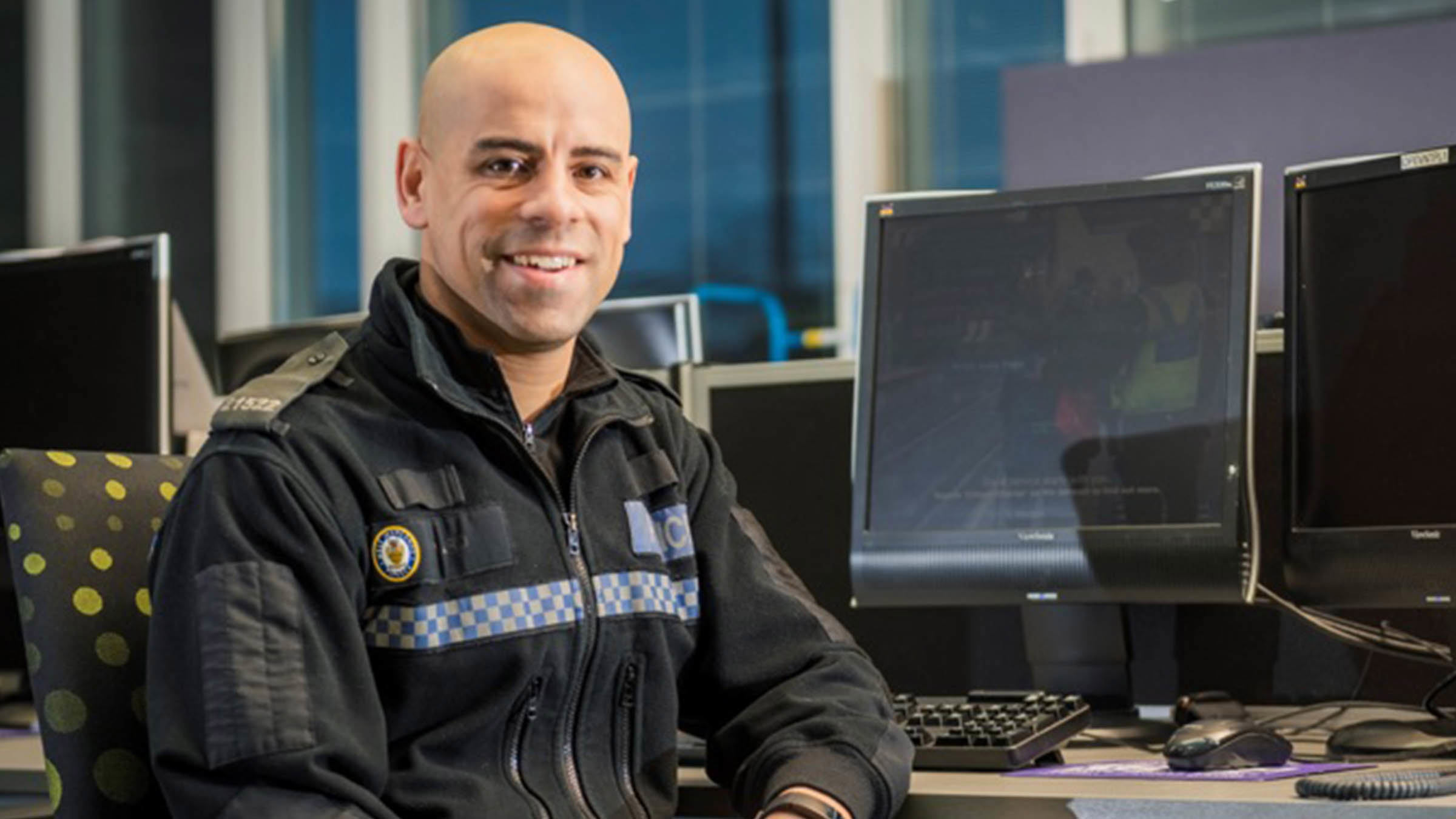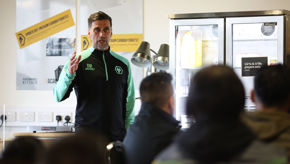As part of Wolves’ One Pack Week, wolves.co.uk spoke to West Midlands Police’s dedicated hate crime officer PC Stuart Ward about fan behaviour at Molineux and on the road.
Wolves announced earlier today that there has been 57 fan sanctions this season so far, for a variety of incidents resulting in a variety of outcomes for the different sanctions.
Ward became the country’s first police officer in a dedicated football hate crime role in 2021 and is at the forefront of stamping out abuse and discrimination of any form at football grounds across the West Midlands, or on social media.
A victim of racist abuse himself as a young footballer, Ward is now making a difference on the terraces, making Wolves a more welcoming environment, likewise Aston Villa, Birmingham City, Coventry City, Walsall and West Bromwich Albion.
Ward has seen an improvement in reporting at Molineux thanks to the club’s Not In Our Pack text service – supporters reporting an incident simply have to text 07723 479887 and start the message with WOLVES, or can speak to their nearest steward.
Reflecting on the past year, Ward discusses improvements made and strides still needing to be taken to make following Wolves a more inclusive and welcoming place for all supporters.
PC Ward, thanks for speaking with us, firstly how do you reflect on the past year, working on making Wolves a more welcoming club to follow?
“Whenever I get interviewed, people always say we’ve had ‘x’ amount of incidents come through – why? It’s because reporting has got a lot better, and people have different methods to report incidents now. Long gone are the days where you must report it to a police officer by calling 999 or 101. Supporters in grounds always have the option of reporting to a police officer or a steward, who would radio to the control room and a safety officer would formulate a plan with the police to identify the individual with a view to arrest. But Wolves supporters have had the option of a text line since November 2021. Everyone has mobile phones and I think a lot of supporters would rather send a text to the control room instead of identifying themselves – they feel more comfortable. Kick It Out reports are always an option supporters like to use and at Wolves, Dave Wood, Fan Services manager, takes a lot of emails after games with reports from supporters.
“There are different methods of reporting, which naturally increases numbers. Society has changed, education is improving, and people are more aware that certain behaviours at football are unacceptable. It’s not just the usual ‘banter’ – just because you’re at football, you can’t behave in a certain way, and supporters are more aware that there are acceptable levels of behaviour and some cross into the criminal threshold when they’re making racist, sexist or homophobic chants, remarks or gestures, and working with the club, we pick up those reports.
“I would always encourage supporters to report incidents on a matchday via a police office, a steward or via the text line, as this gives the police the best opportunity to identify a suspect.”
How important is it to be transparent with incidents, to show supporters that their reports are taken seriously?
“It’s really important to be transparent because, certainly when I speak to supporters when I’m looking at a criminal investigation, the biggest feedback I get is that nothing is going to get done or that it happened last week, and it wasn’t dealt with. It’s important to be transparent for the police and the club, because it shows that if they do report something, they can see an end goal, they can see a result. That process might take time, but they know if they report an incident, the club and West Midlands Police are going to take it seriously and it will be dealt with. If criminal charges are brought, and the offender goes to court, then it’s about providing a result for the witness, so they can see what actually happens. From that, it encourages other supporters to come forward and that’s happened previously through media releases about incidents – supporters gain encouragement and trust because they know it’s going to be dealt with.”

How much can being transparent act as an educational tool to stop people committing hate crimes in the future?
“It can definitely act as an education piece, as well. When we put out there that a certain fan has behaved in a certain way, with a certain word or gesture, and that they’ve now gone to court and have been convicted, it raises the education and awareness to other supporters about certain incidents. I can only speak from a police point of view, but if we can explain to supporters the consequences of behaviours, it’s actually proactive work. We’re making them aware of criminal behaviour and offences, to try and stop it happening in the future.”
In your six years covering football, how has supporter behaviour changed inside grounds?
“I feel a minority of supporters behaviour has got worse since Covid. I don’t know why that is. With the excitement of coming back to football you could understand it a bit, but it’s continued, and behaviour needs to improve, most definitely. Some supporters you speak to don’t want to be seen as a ‘grass’. They fear repercussions if they do report something, but it’s our job as the police to play our part and improve education and if we need to, by working with The Crown Prosecution Service get successful outcomes in court. It is a straightforward process, but it’s probably new to most supporters, reporting an incident and potentially having to go to court. More supporters are coming forward, feeling more confident.”
How important is it that fans come forward with reports and what support is there available for them?
“First and foremost, I encourage supporters to report incidents, however uncomfortable they may feel doing it. A lot of supporters might fear repercussions or worry about the act of physically reporting it to a steward. The text line at the club which is promoted on the back of tickets and around the concourse is a brilliant way of reporting because they can do it from the comfort of their seat. That individual can be dealt with and be picked up by the police, and we can pick up the report in terms of getting statements and discussing what happens next.”

To what extent is football a tool for improving awareness in wider society?
“Football, certainly the Premier League, is the most powerful sport in the world. People sit up and listen to football. We’ve done a lot of work on education around discriminatory behaviour. We’ve gone out and spoken to players at all the clubs, we’ve spoken to youth teams, we’ve gone into schools across the West Midlands, some in Wolverhampton, and jobs that we’ve dealt with, we’ve highlighted them in the media, to raise awareness of unacceptable behaviour. We’ve gone around different forces across the country, highlighting the work of West Midlands Police, and other police forces have looked at recruiting officers into hate crime roles to tackle issues. The Metropolitan Police have employed someone and so have Staffordshire Police, so we’re slowly getting there, but it’s obviously not there yet.”
Finally, how welcoming do you see football grounds across the country as a fan yourself?
“I always go back to when I went to football with my family as a young lad. The buzz of going to football, watching your team play, a good atmosphere between home and away fans. Unfortunately, that has changed now because I don’t go as a supporter, I work games, and you see appalling behaviour from a minority of supporters. If I took my family to a football game, the question is would I want them to hear discriminatory comments, see people fight or flares being lit? Of course not. The experience of going to football should be for everyone and, unfortunately, it’s not because it’s spoilt by the minority who behave in that sort of manner. It is important to always report matters to the club and the police so we can try and remove hate, discrimination and poor behaviour from the game and in the stands and make it enjoyable for everyone.”












